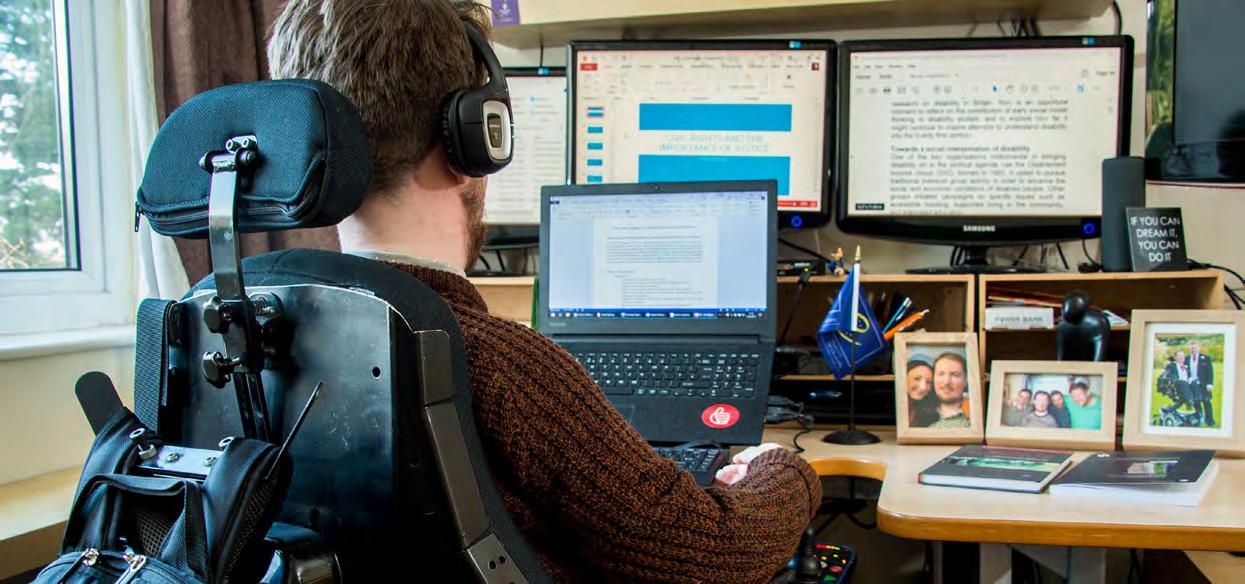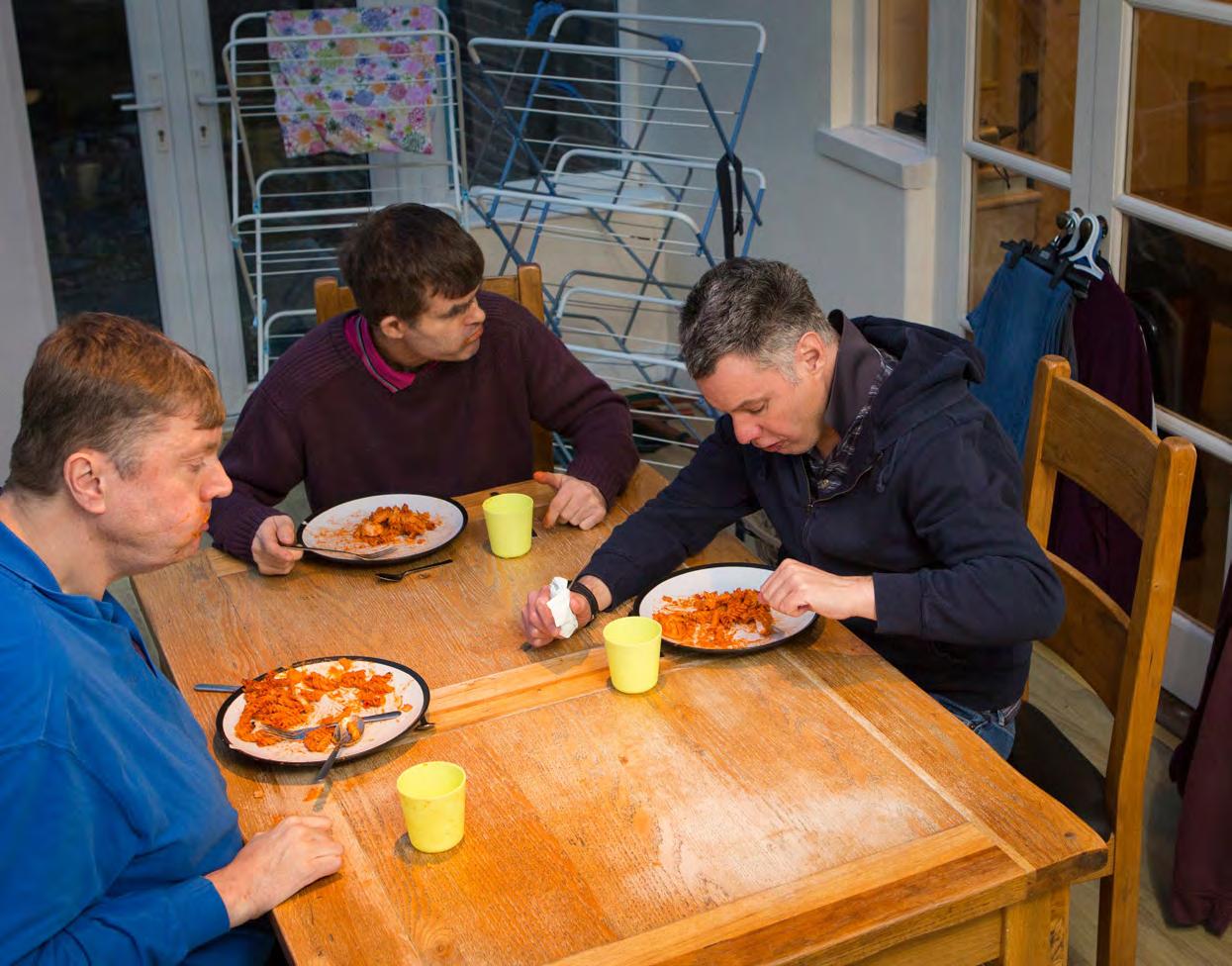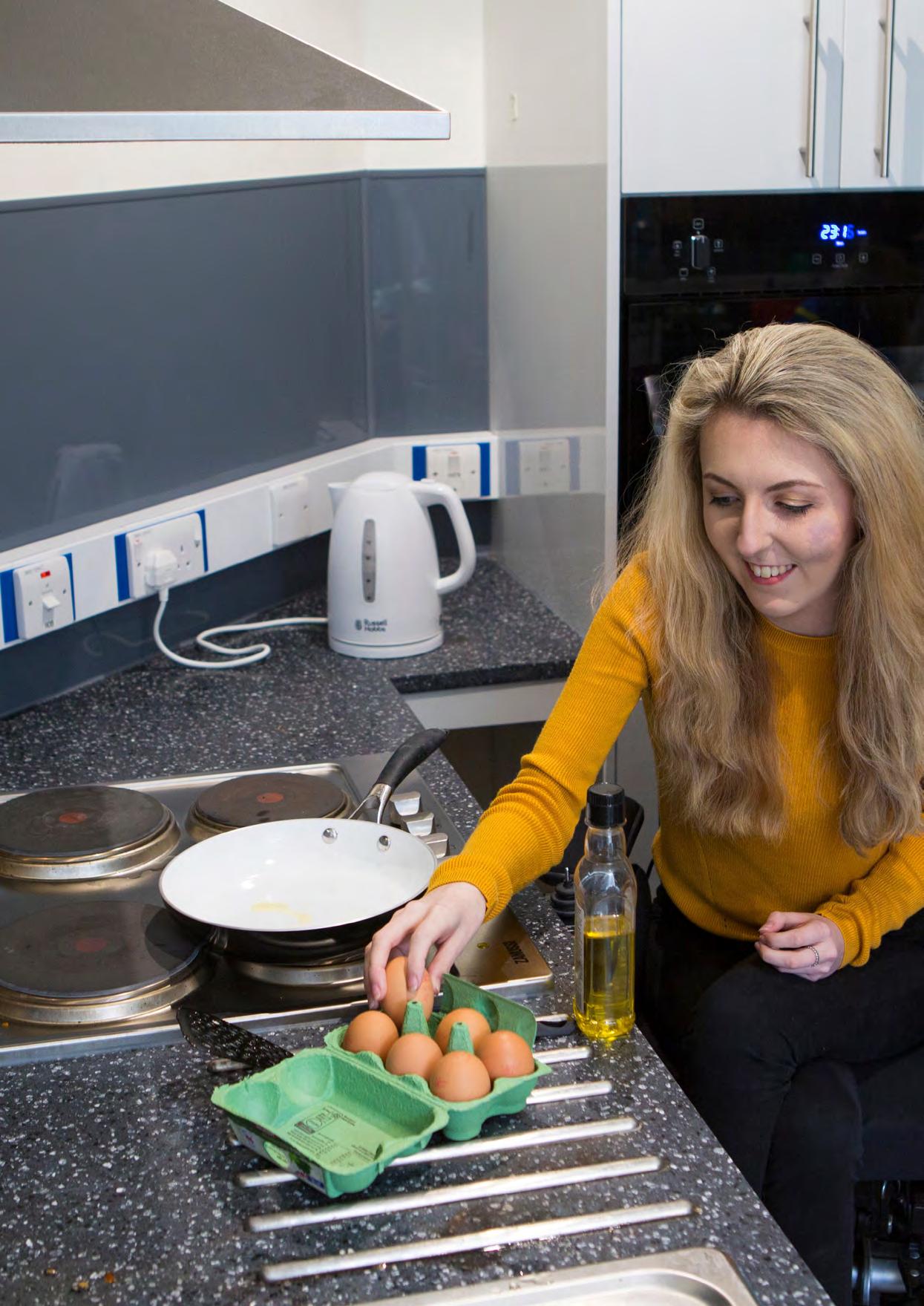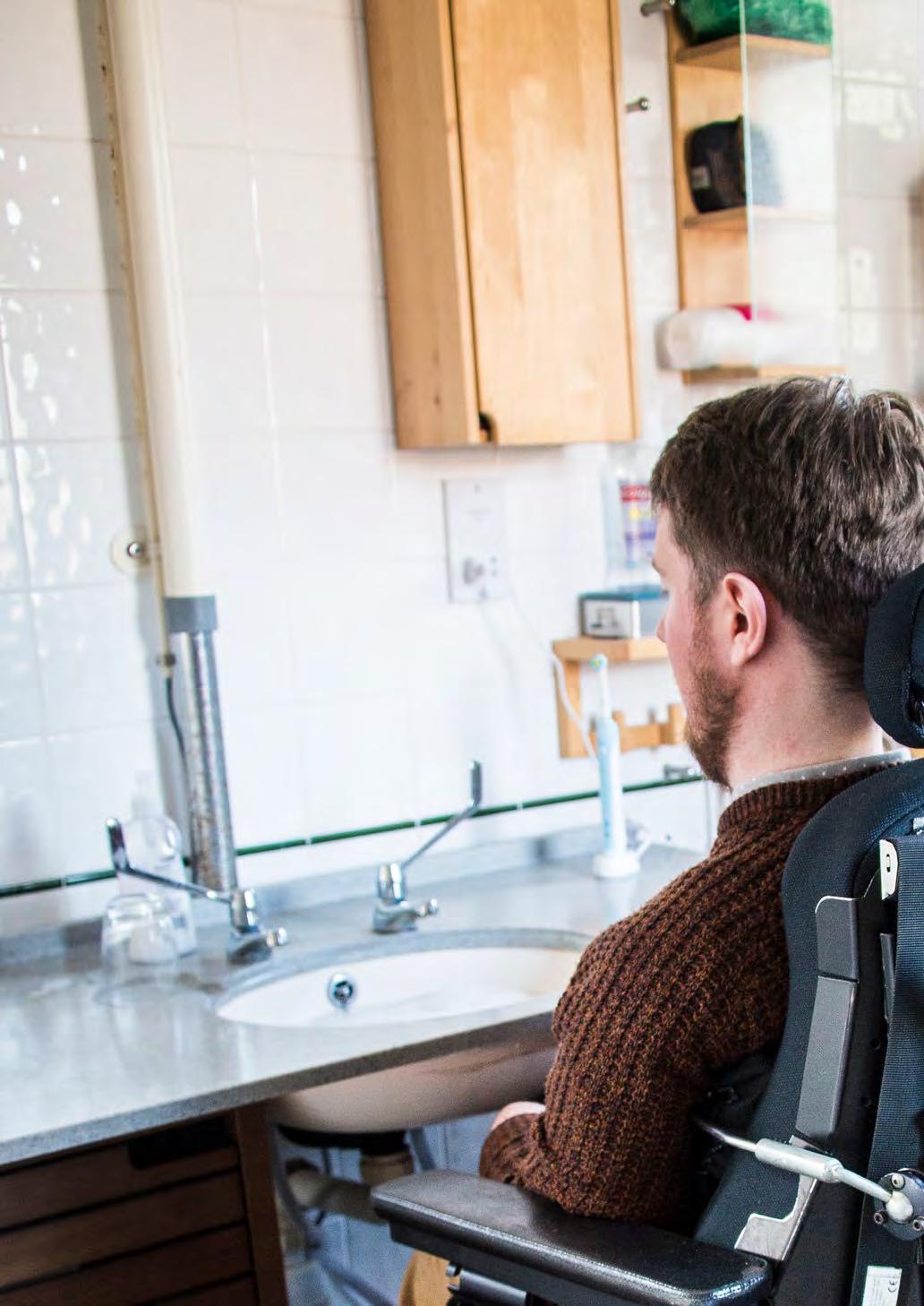
18 minute read
5. Supporting people to help them live independently
5. Supporting people to live independently
It takes more than bricks and mortar to enable disabled people to live independently; support is also vital. Support can take many forms, yet the provision of good-quality advice, advocacy and guidance for housing is patchy and hard to find. Changes to funding for tenancy advice and for supported housing has created uncertainty for disabled people and for housing providers.
Advertisement
Advice, advocacy and guidance are very important when weighing up housing options. Our evidence indicates that disabled people are able to exercise their rights more effectively when they have access to quality specialist information and assistance, but that accessing this type of support is very difficult.
Call-for-evidence respondent
Changes to the benefits system and related assessment processes have overwhelmed many advice services. Specialist advice agencies told us that specialist advice services for disabled people are closing due to lack of funding, and that pressure is being put on generic advice services to provide specialist support outside their area of expertise. Provision is patchy, and because of the complexity of housing provision and the changes to welfare policy, information can quickly become out of date.
“There are plenty of organisations who say they [provide advice], but often the information is incorrect and you have to check up on them. There are often a number of organisations that do the same thing. It would be better to have a one-stop-shop, with just one doing debt, another dealing with repair issues, etc. The third sector is awash with people saying they can help, but often they can’t.”
Call-for-evidence respondent
Disabled people, and in particular those with learning disabilities, sensory impairments or mental health conditions, report that they have difficulty getting adequate support from housing providers. This ranges from providers’ reluctance to supply information in accessible formats, such as ‘easy read’, to a lack of specificity in advertisements for accessible properties, and a lack of assistance with applications. This includes tenancy agreements and correspondence from the landlord, which typically contains language that is legalistic and inaccessible to many people, including those with learning disabilities.
Local authorities across Britain have a duty to make reasonable adjustments under the Equality Act 2010. In England, the lack of support is in direct contravention of housing providers’ statutory requirements under the Housing Act 1996 (s166A(9)), which stipulates that applicants should be able to receive information and assistance free of charge.

Advice organisations that responded to our call for evidence raised the concern that many local specialist services are losing out on funding. This has been caused by funding pressures; there seems to be a trend for local authorities to rationalise their advice services into one contract, providing a general service.
Call-for-evidence respondent
A key theme in the testimony that we received, through our call for evidence, was that there is a strong link between physical and mental health, particularly if there are delays to finding suitable accommodation or making adaptations. Effective advocacy and advice to navigate the often bewildering systems is essential in providing both practical and moral support.
Some disabled people said that they had received support from independent advocates, or from health and social care professionals, which made their search for suitable accommodation much easier. One local authority worked with third-sector partners to develop an innovative brokerage scheme which provides person-centred advice and support, primarily to people with mental health conditions.
Challenging a decision
Disabled people report that legal advice can be almost impossible to obtain. Citizens Advice do not typically support appeals, and disabled people reported that advice appointments were typically limited to one half-hour session. Delays are commonplace, although Registered Providers of Social Housing/Registered Social Landlords sometimes pay to fast-track their residents. Increasingly Registered Providers of Social Housing/ Registered Social Landlords provide this service in-house, and see it as a necessary part of helping their residents to sustain their tenancies, despite financial pressures from UK Government-mandated reduction in rents. With the rapid growth of the private-rented sector in England in recent years, the lack of good-quality advice and information is a significant concern.
The report of the Women and Equalities Committee’s (2017) inquiry into disability and the built environment highlighted the fact that making a legal challenge is typically very difficult for individuals.
“An approach that relies on individual disabled people bringing a challenge each and every time they encounter a disabling barrier is neither morally nor practically sustainable. This is, unfortunately, the primary method of enforcement provided for by the Equality Act 2010.” (p.7)
Following reforms in 2013, housing is largely outside the scope of legal aid (Legal Aid, Sentencing and Punishment of Offenders Act 2012, Schedule 1, Part 1). When the reforms were proposed, the UK Government acknowledged that people with the types of housing claims that it planned to exclude were more likely to be ill or disabled (Ministry of Justice, 2011).
Since the reforms were introduced, the number of housing cases that are funded for initial legal advice has fallen year-on-year: 85,192 in 2012-13 to 35,469 in 2016-17, which represents a fall of 58 per cent (Legal Aid Agency, 2017). Funding for legal advice centres has been significantly reduced, and advice ‘deserts’ have emerged in parts of the country that have little or no provision (EHRC, 2015). The Law Society has found that almost a third of areas in England and Wales have one or no legal aid housing advice providers (Law Society, 2017). This can lead to people having to wait for legal advice that they need urgently, or being unable to access legal aid at all.
The Low Commission inquiry into the future of social welfare law in England and Wales highlighted the importance of specialist advice for people with moderate learning disabilities, cognitive impairment, or visual impairments. It found that specialist support services have diminished, due to cuts to legal aid, as well as the reductions in local authority funding. This has destabilised and reduced the advice and legal support sector at a time of increased need (Low Commission, 2014).
Sustaining tenancies and floating support
Tenancy support or ‘floating support’ can be tailored to meet individual requirements, but it typically involves several hours’ support a week to sustain a tenancy, and can include more intensive support options if required. It often involves help with money management and benefits, or other issues such as isolation or harassment. This type of support has been found to provide immense social and economic value, because it enables people to live independently in their homes. Tenancy support is preventative, and can anticipate and address issues which may lead to further costs down the line (for example rent arrears or people requiring crisis services).
In a recent report Mind identified that support is especially important as people move between tenures; for example, from supported housing to general needs or privately rented accommodation (Mind, 2017).
The Supporting People Programme
The Supporting People Programme was set up in 2003. It brought together housingrelated funding streams across Central Government into a single programme. Funding was ring-fenced within local authorities, to provide housing-related support services.
Services that developed from this fund tended to be a combination of preventative services, such as floating support, and accommodation-based services. The Programme operated across England, Scotland and Wales, but in 2009 the ring-fenced funding stream was removed.
Since the removal of the ring fence around Supporting People funding in 2009, there is evidence of decreasing funding for support costs in supported housing, particularly in English local authorities (National Audit Office, 2014).
The Supporting People Programme still operates in Wales; however, the ring-fencing for the budget will come to an end in 2020. The fund currently supports 67,000 people in Wales (Wales Audit Office, 2017), and so this was raised as a serious concern in our feedback from Welsh housing providers.
In England, funding for tenancy support services has significantly decreased since the demise of the Supporting People fund. Evidence submitted to our inquiry from social housing providers indicates that this gap in funding tenancy sustainment support has had a particular impact on people with mental health conditions, and those with moderate learning disabilities.
Call-for-evidence respondent
Evidence indicates also that in England there is a real lack of clarity between housing providers, local authorities, Clinical Commissioning Groups and the third sector, as to whose responsibility it is to provide support to fill the gaps (MHP Health, 2014). Pressure is being felt acutely by Registered Social Landlords/Registered Providers of Social Housing, who told us that the fund closure and cuts to other public services meant that they increasingly felt that they were left to ‘pick up the pieces’, and deal with issues that might previously have been picked up by health services or social work services. This is further compounded by a lack of advice and advocacy services to point their tenants towards.
While most Registered Social Landlords/Registered Providers of Social Housing do their best to meet the needs of current tenants, there are disincentives to taking on new tenants who are not ‘tenancy-ready’, as the support is often not available.
At a focus group for Registered Social Landlords/Registered Providers of Social Housing, there was a strong consensus that mental health is at the top of their concerns, and they often feel that they are left to deal with failures in other services. Both the delay and the difficulty of accessing support can precipitate a failed tenancy.
Poor mental health can also affect people’s ability to manage their tenancy successfully, making them vulnerable to eviction, and any deterioration in mental health can make it difficult for people to engage with support services (Joseph Rowntree Foundation, 2017). This is reflected in NHS data which shows that only 31 per cent of those receiving community mental health treatment are in settled accommodation (NHS Digital, 2017). This data will include those living in specialist supported housing, as well as those who are in hostels or who are homeless. This reinforces what we have heard in our evidence: that those with mental health conditions struggle to find housing in any sector. How the Homeless Reduction Act 2017 is interpreted by local authorities in England will be important, and an opportunity to assist those ‘at risk’, many of whom will have mental health conditions.
What is the role of supported housing?
There has been a lengthy review of supported housing by the UK Government which has caused uncertainty for disabled people and housing providers. We heard a range of views about the role of supported housing, including some concerns that supported housing does not always promote the right to independent living. Concerns raised by stakeholders highlighted that there can be undue pressure to move into supported housing and that the focus should be about providing the support people need to live independently in their own home, if that is their preferred choice.
The definition of supported housing is extremely broad. It includes any housing scheme in which accommodation is provided alongside care, support or supervision. Supported housing is a significant part of housing provision, and models vary hugely, depending on the requirements of the people who live in it.
According to the Supported Accommodation Review, approximately 71 per cent of supported housing is for older people with support needs. A significant proportion, however, is for people with much broader requirements, including learning and physical disabilities and people with mental health conditions. There are an estimated 651,500 accommodation-based supported housing units across Britain. The majority (85 per cent) are in England, with nine per cent in Scotland and six per cent in Wales (DCLG and DWP, 2016b).
Demand for supported housing is increasing, due to the increasing numbers of people with learning disabilities, the closure of long-stay hospitals, reductions in residential care provided by local authorities, and increasing numbers of older people. Research by Rethink suggests that there was a shortfall of 15,640 lettings for people of working age during 2015/16 (Rethink, 2017).
Supported housing is more expensive than general-needs accommodation, but it is typically less expensive than residential care, and it generates substantial cost savings for other parts of the public sector (Golden Land Housing, 2016). DCLG analysis estimates that the net fiscal benefit of providing supported housing is £3.53 billion per year (DCLG and DWP, 2017a).
The National Housing Federation has reported that for older tenants, the annual saving that supported housing represents, through reduced reliance on health and social care services, is £3,000 per person, while for people with learning disabilities and mental health conditions the saving is between £12,500 and £15,500 (National Housing Federation, 2017).
Different models typically operate for people with learning disabilities; a common form of provision is ordinary or purpose-built houses being shared by a small number of disabled people. Typically each person has their own bedroom along with a funded level of staff support, which may be visiting staff or 24-hour support, depending on people’s requirements. Stakeholders reported that ensuring that people were able to exercise choice and control over who they live with, who can visit and when, was very important and they gave examples of where this had been restricted. Concerns were raised by stakeholders that people with learning disabilities are not always able to exercise choice and control in this context. There is a need to ensure that people with learning disabilities have access to good-quality, accessible advice and advocacy. An additional concern raised was that care packages are often delivered by the same provider as the housing, making it very difficult to change carers if people want to.
A significant challenge with supported housing and mental health is that there can be undue pressure to ‘move on’ as and when their condition improves, particularly when it is in such short supply. This can create a disincentive for people to do as much as they can for themselves because if they are seen as ‘improving’ then they will be faced with losing their home and their friends in order to move on to ‘independent living’. Moving house is stressful for most people and this stress can exacerbate mental health conditions.
This is one of the key reasons why the concept of ‘floating support’ was developed, the principle being that the person remained in their own home and that support could be decreased or increased – ‘floated in or out’ – in line with the person’s needs.
Supply of supported housing
During the course of the inquiry, the Government have had policy and funding for supported housing under review but it is unclear what the outcome of this review will be. Housing providers have highlighted the fact that lack of certainty in the funding and pressure on social care budgets of supported housing has led to a massive reduction in planned schemes despite increasing demand.
The National Housing Federation’s survey of 69 housing associations, which together provide a third of supported housing, has revealed that the associations had previously planned to build 8,800 units of supported housing, but now have a total pipeline of just 1,350: this means that 85 per cent of schemes were on hold in 2017 and 2018 (NHF, 2017).
The rights and entitlements of those living in supported housing
Ensuring that the right to independent living is promoted in the supported housing sector is essential.
In general, local authority and Registered Social Landlords/Registered Providers of Social Housing provide similar tenancy rights to standard tenancies. This may not, however, be the case where supported accommodation is provided by the private sector. While the private sector can also offer grant assured tenancies, they may be inclined to grant assured shorthold tenancies instead, which give the tenants less security of tenure.
We would advocate for the standardisation of these rights wherever possible, to ensure equality for disabled people, older people or people with mental health conditions, so that tenants in supported accommodation have the same rights as they would with a standard tenancy.
Short-term accommodation
Our inquiry took evidence from a number of individuals with long-term health issues or mental health conditions, who are living in temporary hostel accommodation. We repeatedly heard testimony regarding hostels that were infested with vermin, mouldy and in a very poor state of repair, which led to deterioration in both people’s physical and mental health. In addition, little consideration was given to how people were allocated, and with whom they would be sharing facilities. One example was of a person with extreme lactose intolerance having to share a kitchen space, presenting a significant health risk. Residents also expressed a fear of turning down unsuitable accommodation, in case they were categorised as intentionally homeless and left without further support from their local authority. Wheelchair users reported that they were terrified of being made homeless because none of their local hostels were wheelchair-accessible.
The lack of ability to complain was a common theme in short-term accommodation, with the local authority and landlords seemingly unresponsive to tenants’ concerns.
The Joint Select Committee on the Future of Supported Housing made a similar finding, and made the following recommendation:
“Tenants must be able to make complaints about the quality of the service they are receiving without fear of the consequences. However, current redress mechanisms in England are unsatisfactory and require a thorough review by the Government. The Government should ensure tenants are appropriately and adequately supported in seeking redress where the quality of the service they receive is inadequate.”
(CLG Select Committee, 2017)
A new funding model for tenancy support
The closure of the Supporting People fund in England has had a significant impact on disabled people. It has reduced the support that people need to sustain their tenancies and prevent potential crisis situations.
Any new funding for supported housing would be more effective if it could be used flexibly, so that it could also provide support to those people requiring support, not just those in supported housing.
For example, people with moderate learning disabilities do not generally meet the criteria to qualify for supported accommodation, but they would benefit from additional support in their homes. This would help them to live independently, as well as preventing harassment and isolation. Again, this support would reduce the risk of a crisis, leading to people needing more intensive housing options, but it is unclear who should provide it.
Any new fund for temporary accommodation should provide a continuum of support, not just support at the crisis end. Preventative measures are much cheaper than dealing with a crisis, and they have much better outcomes: there are already local authorities investing in this approach.
If local authorities are going to be able to invest in preventative services, additional funds would need to be made available, at least initially. The savings from investing in preventative services would take time to filter through to a reduction in demand, relieving pressure on crisis services. In addition, this approach would help to bolster current initiatives to reduce homelessness.

What needs to change?
Local authorities need to commission and fund the adequate provision of bespoke advice for disabled people, in partnership with Registered Social Landlords/Registered Providers of Social Housing and the third sector.
UK Government should allocate additional resource to the proposed temporary accommodation fund for England, and allow it to be used flexibly for tenancy/floating support by local authorities to prevent people from crisis situations and to provide crisis accommodation.
In England, Clinical Commissioning Groups and local authorities should jointly commission a range of support, including mental health floating support, to help disabled people sustain their tenancies. In Scotland, once funding for supported housing is devolved to the Scottish Government, commissioning should be managed by Integrated Authorities. In Wales, once funding for supported housing is devolved to Welsh Government this should be managed by Regional Partnership Boards.
Housing providers and local authorities need to be confident that there will be a long-term commitment from the UK Government to provide stable funding and sufficient incentives for supported housing, to meet the anticipated growth in demand.
Any new guidance that is issued to local authorities on the commissioning of supported housing and housing support should highlight the importance of engagement with disabled stakeholders, so that they can provide meaningful input to schemes and scrutiny of ongoing programmes.
Rights, freedoms and choice need to be the same for those disabled people in supported accommodation as they are for those with a standard tenancy, and robust complaints mechanisms should be in place.
Recommendations
• The UK Government to ensure that the new policy and funding model for supported housing upholds the rights of tenants, and that freedoms and choice are not restricted, in line with UN Convention of the Rights of Persons with Disabilities (UNCRPD). The new model needs to address the current uncertainty and deliver a stable market for both housing providers and those providing specialist support.
• Local authorities to ensure that housing, care and health services are fully integrated and sufficient funds are available to support people to live independently, and that there is an increased focus on prevention.
• Local authorities to provide increased specialist disability advice and advocacy services for housing options.
In England and Wales, we are calling for:
• The UK Government to ensure that its review of the Legal Aid, Sentencing and Punishment of Offenders Act 2012 considers the impact of removing housing from the scope of legal aid for disabled people, and takes effective steps to mitigate any identified impacts.










